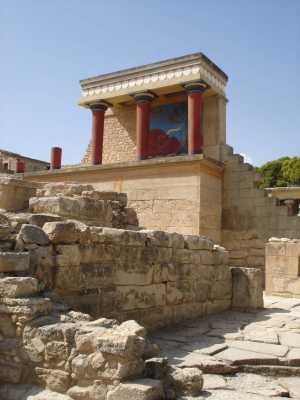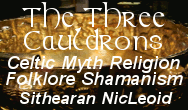Ariadne's Tribe: Minoan Spirituality for the Modern World
Walk the sacred labyrinth with Ariadne, the Minotaur, the Great Mothers, Dionysus, and the rest of the Minoan family of deities. Ariadne's Tribe is an independent spiritual tradition that brings the deities of the ancient Minoans alive in the modern world. We're a revivalist tradition, not a reconstructionist one. We rely heavily on shared gnosis and the practical realities of Paganism in the modern world. Ariadne's thread reaches across the millennia to connect us with the divine. Will you follow where it leads?
Find out all about Ariadne's Tribe at ariadnestribe.com. We're an inclusive, welcoming tradition, open to all who share our love for the Minoan deities and respect for our fellow human beings.
Mystery at Midsummer, Minoan Style
Mystery plays were a big part of life in the ancient world, when people’s seasonal work was punctuated throughout the year by sacred festivals of all sorts. What on earth is a mystery play? It’s not a whodunit, like a modern murder mystery. In the case of mystery plays, the word takes on an older meaning.
My dictionary defines it as ‘a religious truth that one can know by revelation alone,’ in other words, something you have to experience yourself instead of just being told about it. And that’s what mystery plays are all about: letting you have the experience of the deities, the myths, the sacred, right there in your own life.
A mystery isn’t just something you experience; it changes you from the inside out.
The modern western world still has mystery plays of a sort. The ‘living nativity scene’ that some Christian churches put on around Christmas is a snapshot or tidbit of a mystery play, and those huge Passion of Christ productions are the full-scale deal, a mystery play about the Christian festival of Easter.
But for most people these days, I suspect the movies largely take the place of the old mystery plays, allowing us to roll ourselves up emotionally in the stories that make up the mythology of the modern world: superheroes, science fiction, fantasy.
But the ancient Minoans didn’t have movie theaters or televisions. They got their mystery play fix live, on those special days during the year when the deities moved among mortals. Right now we’re coming up on one of the big festivals the Minoans celebrated: Summer Solstice. Let’s imagine what that might have been like, way back when.
You’re up early in the morning, right as the dawning Sun begins to light up the city of Knossos. You have a quick breakfast of barley bread and figs washed down with diluted wine, then head out to join the others who'll be enjoying the festivities today. It’s already warm out and, since this is the Mediterranean, it’s the dead-and-dry season. The fields lie fallow after the springtime harvest; your feet kick up dust as you work your way down the stone-paved street toward the temple complex that crowns your city.
You’ll only be attending the public portion of the activities today since you’re an ordinary Minoan, not a member of the priesthood or one of the wealthiest merchant families. Those people were up hours before daybreak, crowding into the courtyard of the temple, standing in rapt silence to await the dawn.
They all stood facing the chamber that would come to be known, centuries later, as the Throne Room. In this room, half a year ago, the infant Dionysus was born to the mother goddess Rhea as the first rays of the Midwinter Sun lit up the birthing chair on the right wall of the intimate space.
Today at dawn, as the Sun Goddess Therasia is at the height of her power, the Midsummer Sun illuminated the opening to the adyton, the artificial cave built into the floor on the left side of the room. At that moment, the god who had been hidden in Rhea’s cave for half the year emerged, fully grown, standing tall and proud in the first rays of the Midsummer morning.
Now those people who were lucky enough to witness Dionysus emerge from the cave are making their way out of the courtyard, joining the crowds that are moving up every street from the town toward the temple on the hill. You move along with the others, streaming to the great plaza that stretches along the west side of the enormous temple-palace complex, hurrying to find a good place to stand. You wipe the sweat off your forehead as the Sun continues to slide up across the sky, baking the island with its summer heat, and feel a pang of envy for the lucky people who are seated on the platform near the stage, since they'll be in the shade for some time yet.
After a few moments of jostling through the crowd, you position yourself along the back of the plaza. You manage to edge into the slim shade of a tree that borders the paved area, then you realize you can step up onto a small boulder and see above the crowd. You're lucky to have a clear view across the plaza. You can see that the side of the building is draped with golden banners and greenery, and a large stage has been erected against its wall. The stage is still in the shade, but it won’t be for long. Just as you’re wondering how long you’ll have to wait, a glint of gold from off to the side catches your eye.
Along with the rest of the crowd, you turn to look toward the causeway. There, treading down the length of the sacred road, crossing the river toward you, is a golden entourage. You can hear the beating of drums, the rattling of sistrums, the shrill voice of a flute and the bell-like tones of a lyre as the group approaches. The cohort is led by a handful of priestesses, arrayed in their finest garb, with jewels glinting from the hems of their flounced skirts and the edges of their open-front tops. They walk with their arms upraised, acknowledging the presence of the goddess in their midst. Behind them marches a group of priests – young men in short kilts with jeweled daggers at their waists followed by older, bearded men wearing long robes shot through with threads of gold. And behind them follows the centerpiece of the entourage.
A litter, borne aloft by six tanned and muscular men, bears a woman of surpassing beauty. Her curly black locks glisten in the morning sunlight. Her golden brown skin glows, set off by the rich colors and sparkling gems of her clothing and jewelry. Earlier this morning, she was only a woman – the head of the College of Priestesses, a powerful woman, to be sure – but still a mere mortal. Now she bears the goddess Ariadne within her, the Goddess Who Comes to meet her lover on this special day.
The glistening entourage crosses the river and approaches the temple, stopping at one end of the stage. The crowd moves as one, lifting fist to forehead in the gesture of respect for the divine, murmuring her name and asking for her blessings on their lives. You offer her your own special prayer, and after a moment, you know she has heard you.
The goddess on her litter glows in the sunlight, but the stage still lurks in the shadows. The musicians fall silent, and the crowd holds its collective breath, waiting for the moment they know is coming. Even the birds stop singing. The Sun slides slowly up the sky, reaching higher and higher, until its light touches the edge of the stage and spreads soundlessly wider and wider, engulfing the stage in its golden glow.
Just as the Sun reaches its highest point in the sky, a great clamor arises from the musicians, who beat their drums and shake their sistrums with great vigor. You turn from them to look at the stage just in time to see the god step out into the sunlight. Again, the people raise fist to forehead to salute the divine among them.
Dionysus stands tall, his broad, brown shoulders flexing as he stretches his arms out in a gesture that encompasses the whole crowd with his blessing. He wears only a loincloth of purple and gold, the colors the people hung from their houses and temples half a year earlier in celebration of his birth. His glossy black curls fall loose to his shoulders, and he smiles at the people. His people. But then his face goes dark, and he begins to speak the words everyone knows by heart, the tale of his birth at Midwinter and his seclusion in the cave, awaiting the time of emergence into the bright world of Midsummer. He speaks of loneliness, of longing, of desire, and holds his hands out, palms up, to show that they are empty – he has not found the one he seeks.
As he was speaking, the golden entourage made its silent way across the plaza, between the crowd and the stage, until the litter stood just below him. Now he stands, empty hands outspread, as the goddess speaks. She talks of bringing the rains in the autumn, blessing the crops as they grow through the winter. She tells of her harvest-time journey to the Underworld of the Ancestors at Spring Equinox, carrying to them the thanks and blessings of the people for a bountiful crop, and her emergence from that realm as she searches for her lover. You know her words by heart; you've heard her speak them every Midsummer since you were a child.
“The fields lie bare beneath the Sun;
My work this time of year is done.
My heart it yearns,
My body burns,
The Earth it turns…”
As she speaks these last words, Dionysus turns toward her, still holding out his hands. But now, instead of a gesture of emptiness, they signify invitation. The litter-bearers heft their load upwards until the litter is level with the stage. The goddess stands up, reaching out to take the god’s hands, and steps onto the stage next to him. She holds one hand out toward him, making him an offer, and he grasps her wrist in the age-old gesture of desire. The musicians stir up a clamor with their instruments, and the crowd roars its approval.
The divine pair disappear into a small pavilion that stands at one end of the stage, where in the quiet solitude of each other's company, the two who are each whole to begin with join to become something greater still.
The music plays and the crowd breaks up, scattering to make way for the tables and benches that will hold the bountiful Midsummer feast the temple provides to all the people. You’ll stay and enjoy the food and drink, and you know that in a little while, two people who are no longer deities will emerge from their pavilion to join the crowd in celebration.
May all the deities bless you this and every Midsummer of your lives.
Comments
-
Please login first in order for you to submit comments





















Beautiful!